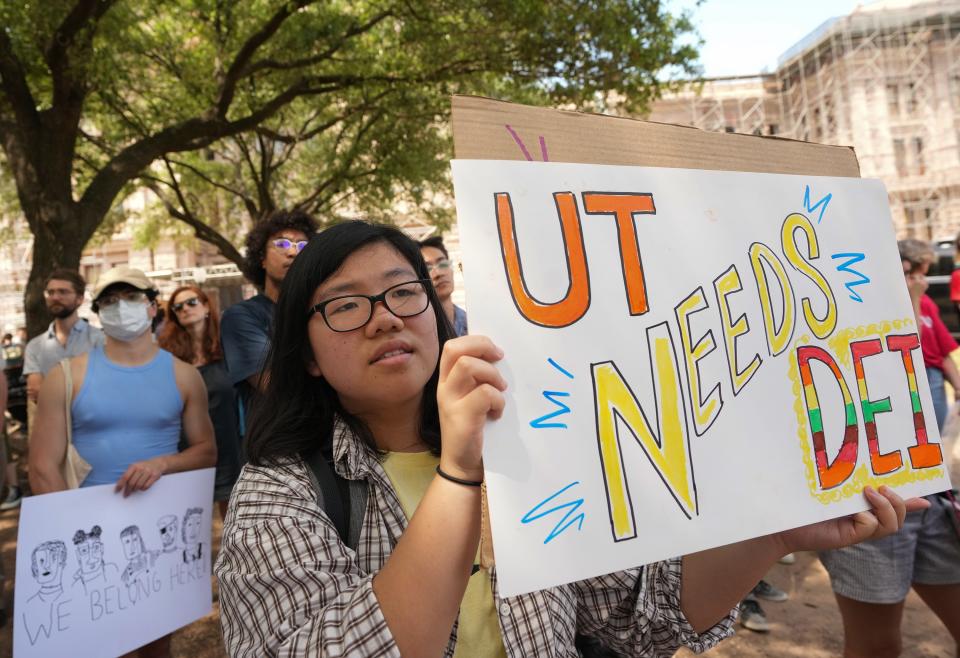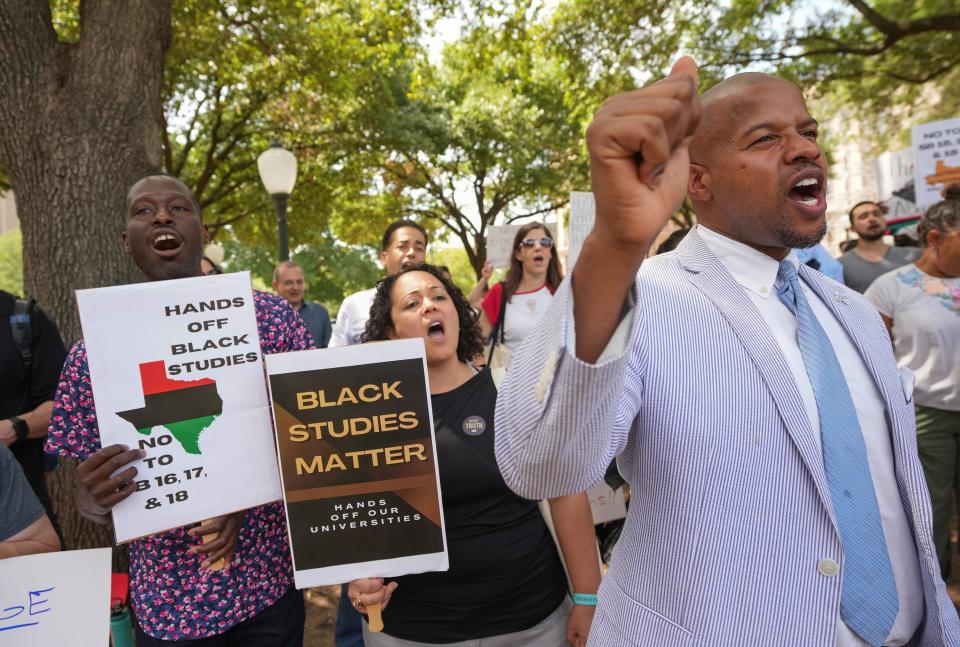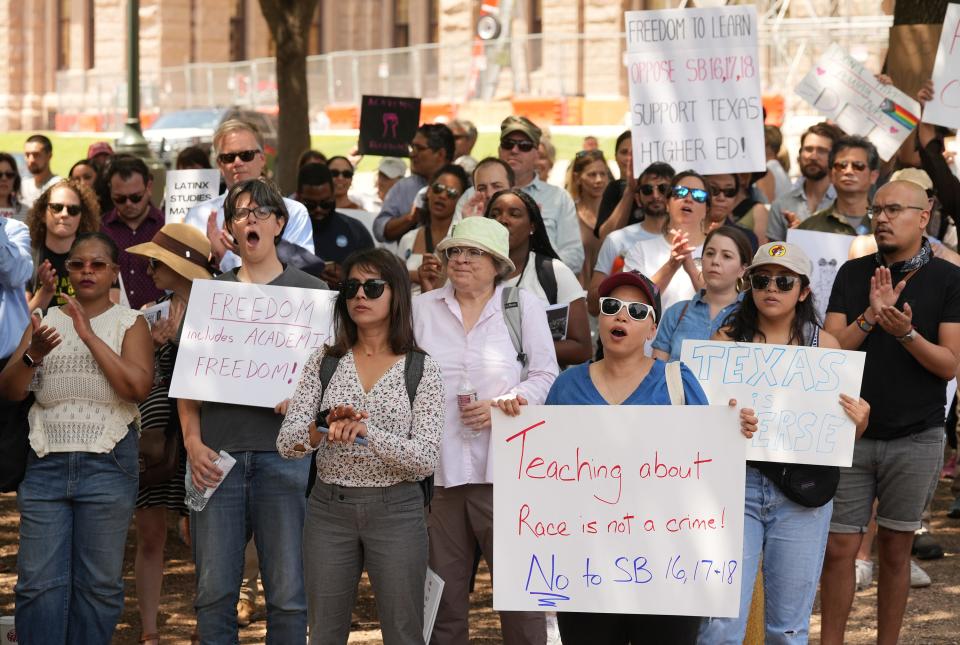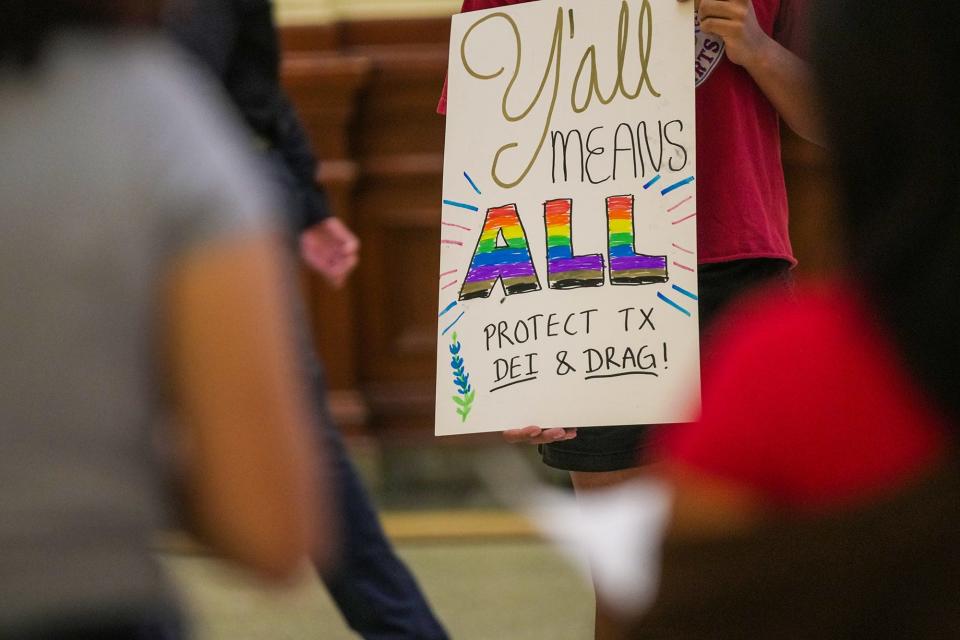'Exhausted', 'confused,' 'unprecedented': Texas professors, students reflect on DEI ban
- Oops!Something went wrong.Please try again later.
Opponents of the ban on diversity, equity and inclusion offices and programs at Texas public universities and colleges say the new law removes protections against the historic exclusion of students of color and those who are LGBTQ+.
“DEI offices are not and have never been an instrument to promote one race or gender or sexual orientation above another,” said Courtney Avant, legislative counsel for the Human Rights Campaign, an LGBTQ+ rights nonprofit. "They have been a critical tool to address inequality and discrimination."
Senate Bill 17 — which prohibits colleges from using state money to provide “special benefits" to people on the basis of race, color or ethnicity; considering diversity in hiring; or conducting mandatory DEI trainings — went into effect Jan. 1.
Sen. Brandon Creighton, R-Conroe, who authored the bill, told the American-Statesman in a statement Saturday evening that DEI programs are ineffective and "inject politics and promote cancel-culture into our colleges and universities."
"I challenge those who still oppose SB 17, to read the legislation — which narrowly ends the practice of compelled speech, mandatory political oaths, diversity training and hiring practices that are not merit based," Creighton said.
SB 17 does not affect academic courses, research, guest speakers, recruitment, provision of health care and student groups, yet the law's broadness and fear of overcompliance have left rights advocates, students and university employees worried that those programs could also get chopped, and that professors will leave.

How some schools are complying with SB 17
Universities across the state began complying with SB 17 at different paces, sometimes months before the law went into effect.
Texas A&M University was among the first institutions to act. It cut its Office of Diversity in September, and, in November, it announced that the student Pride Center would become the Student Life Center.
The University of Texas System, which oversees 14 academic and health institutions, including UT in Austin, released an FAQ guidance in mid-September and finalized its compliance policy in November.
As of Jan. 1, UT-Austin's former Division of Diversity and Campus Engagement is known as the Division of Community and Campus Engagement, and the Gender and Sexuality Center is now the Women’s Community Center.
It's unknown if the Multicultural Engagement Center, which houses six university-sponsored student groups — the Afrikan American Affairs, Asian Desi Pacific Islander American Collective, Latino Leadership Council, Native American and Indigenous Collective, Queer People of Color and Allies, and Students for Equity and Diversity — will continue to operate or be reprogrammed. The center's website was taken down in December.
UT declined to comment further on its changes. Texas A&M did not respond to requests for comment.
Antonio Ingram, assistant counsel at the Legal Defense Fund, a national racial justice advocacy organization, which advocated against SB 17, said DEI bans have only been passed in Texas and Florida — leaving enforcement in “unprecedented territory.”
He said SB 17 attacks students’ ability to find belonging on campuses, or a desire to come to Texas.
“It is creating a chilling effect on people of color and queer students and our allies who want to come to places like UT-Austin,” Ingram said. “Why would you come to an institution that makes you hide parts of yourself or does not give full dignity to all parts of yourself?”

The confusion and despair on campus is profound, said Karma Chavez, a UT Mexican American and Latina/o Studies professor and an executive committee member of the UT chapter of the American Association of University Professors.
“I've been on university campuses for over 20 years, and I've never been on one where the morale is as low as it is right now at UT-Austin,” she said.
Faculty members, she said, are “exhausted.”
“A lot of professors are on the job market right now,” Chavez said.
Chavez, who as chair of UT's Mexican American and Latina/o Studies department, writes letters for colleagues seeking employment elsewhere, and said she has written several.
Creighton, SB 17's author, however, said he has heard from professors and administrators seeking employment in Texas who were previously concerned about the "weaponization" of DEI units and merit-based hiring.
"Now that SB 17 is law, I’m confident that Texas public colleges and universities can return to their core mission of innovation and education — and if they do not, the Texas Senate will be resolute in enforcement of this legislation which includes provisions for university funding clawbacks, should there be violations," Creighton said.
'Did not seem to be valued anymore'
Idia Thurston came to Texas A&M four years ago to work as an associate professor in health promotion and community health. She said a significant selling point for her recruitment was working in the Diversity Science Cluster — a cohort of psychology faculty members and graduate students who research social identities related to sex, gender, race, ethnicity, cultural identity, age, language, sexuality and more.
But within years, she felt like her work was no longer valued. An article she co-authored in 2020 about addressing racism in psychological science received praise nationally, she said, but little attention from Texas A&M.
“Even the science that I was doing, that at the time I was recruited was said was valued, did not seem to be valued anymore,” Thurston said.
Last year, when lawmakers began discussing how to regulate DEI at universities, she worried for her research. After Abbott's office in February issued a memo telling public universities to stop considering diversity in hiring, she was confused about how to recruit staff whose work centered on diversity. Thurston said she and other faculty members stopped working on an internal grant after they were left confused if SB 17 would allow it.
“It was definitely a chilling effect," Thurston said.

Northeastern University tried to recruit her in September 2022. But after having relocated with her family to Texas A&M, she declined. In the months after, as conversations against DEI in Texas were intensifying, she agreed to take a look at the campus in Massachusetts.
By March, the month when SB 17 was introduced in the Legislature and weeks after Abbott’s memo — she accepted the job.
Thurston now is the associate director of Northeastern University's Institute for Health Equity and Social Justice Research. Though research is exempt from the DEI ban in Texas, Thurston said she believes more diversity scholars in the state will look for employment elsewhere.
“This direction, that Texas is going, will drive scholars away,” she said. “I wouldn't be in academia if I could not do this health equity work and, so for it to be on the line, it just wasn't tenable for me.”
Joshua Barbour, a communications professor, worked at Texas A&M from 2008 to 2016, and at UT after that. He loved his time in Texas — he and his wife imagined retiring here. But last year, he relocated north, largely due to state politics.
“I just couldn't see myself continuing to try and do my best work under those circumstances,” Barbour said. “The changes really pointed to a kind of instability and unpredictability that made it difficult for me to make a long-term commitment.”
As a researcher of organizations, he said there is “no more important issue” than how institutions manage diversity.
Barbour, who now is a professor at the University of Illinois Urbana-Champaign, a place and state he said value diversity, said he misses UT, but SB 17 and other state laws changed the landscape of higher education in Texas.
“If I'm having a conversation with a graduate student who's thinking of coming to the university,” Barbour said, “and they asked me, ‘Am I going to be discriminated against because of the color of my skin or because of my religious belief?’ And I can't say with confidence that the institution will make sure that you are protected, that's just a really hard conversation to have.”
'We have a responsibility to speak up'
Avant, the Human Rights Campaign lawyer, said the removal of DEI offices at universities, with an exception for student groups, puts the onus on students to address gaps in need.
“It is a lot to put on their shoulders,” Avant said.
Sofia Alejandro and Yatziry Nava, both Hispanic, third-year students at UT, are starting a Hispanic film student organization at the school. At the group's first gathering, seeing her Hispanic classmates come together in one space brought Alejandro to tears.

“Our perspective wasn't out there and having that space for us, I literally cried at the first meeting,” Alejandro said. “It's not about giving Hispanics more opportunities. It's about leveling the playing field.”
Alejandro and Nava said the overarching feelings on campus right now are confusion and fear — confusion about why DEI is being targeted, and fear of how it will affect not only their experience, but students’ perspectives on diversity.
On Dec. 5, Nava and Alejandro gathered outside on the West Campus Mall to protest SB 17. A few other students joined them.
As a student organization, their group, Acción! Cine Colectivo, will be allowed to seek registration next semester. But Nava, who is the diversity officer of another film organization, said she is already concerned about UT resources the organization will have access to.
“I know a lot of the times these (laws) that are passed … they’re put in place by people who don't really take into account the ones who are being affected,” Nava said. “We have a responsibility to speak up, and that's the only way that we will make sure that those people know how we're being affected.”
Chavez, the UT Mexican American and Latino/a Studies professor, said she’s here to stay — to support students of color and queer students as best she can.
“I've put roots in here, and I want to be here, and I really believe in my students and colleagues,” Chavez said. “But UT and the state of Texas make that very hard to do, I would say.”
This article originally appeared on Austin American-Statesman: DEI ban in Texas colleges leaves students, professors rattled

